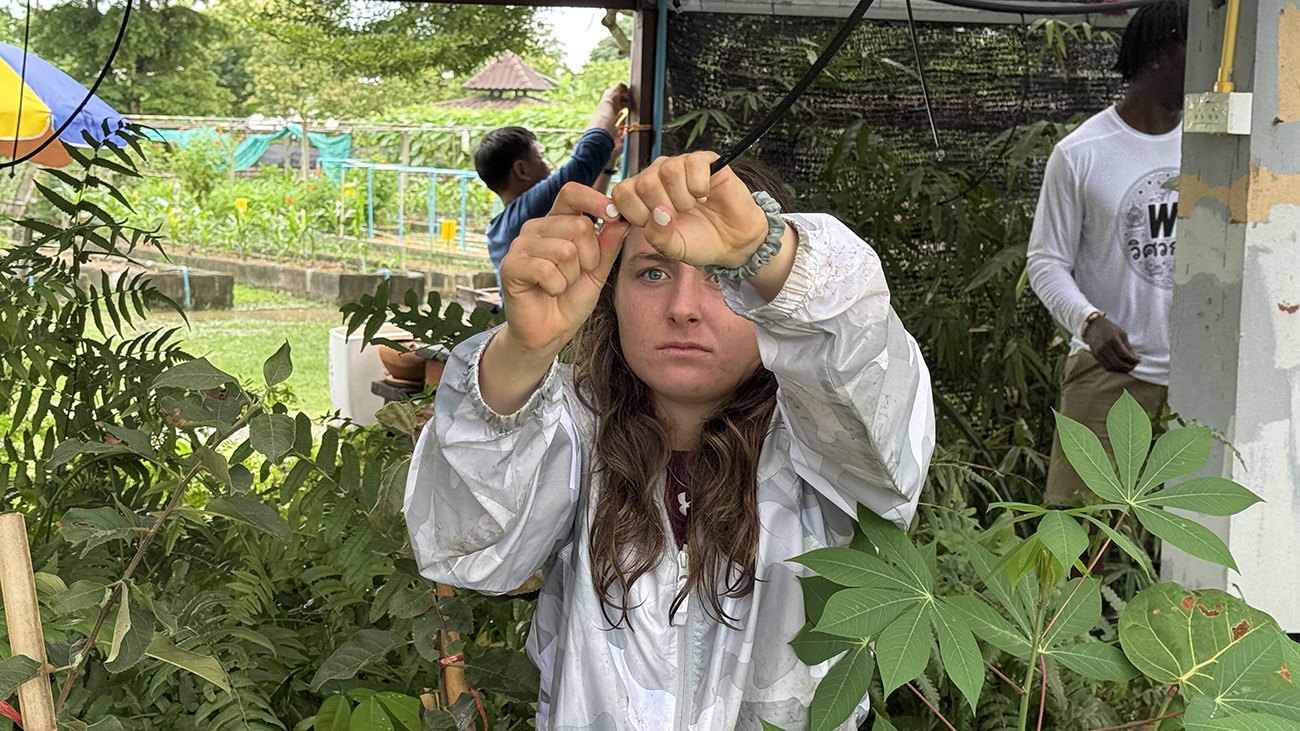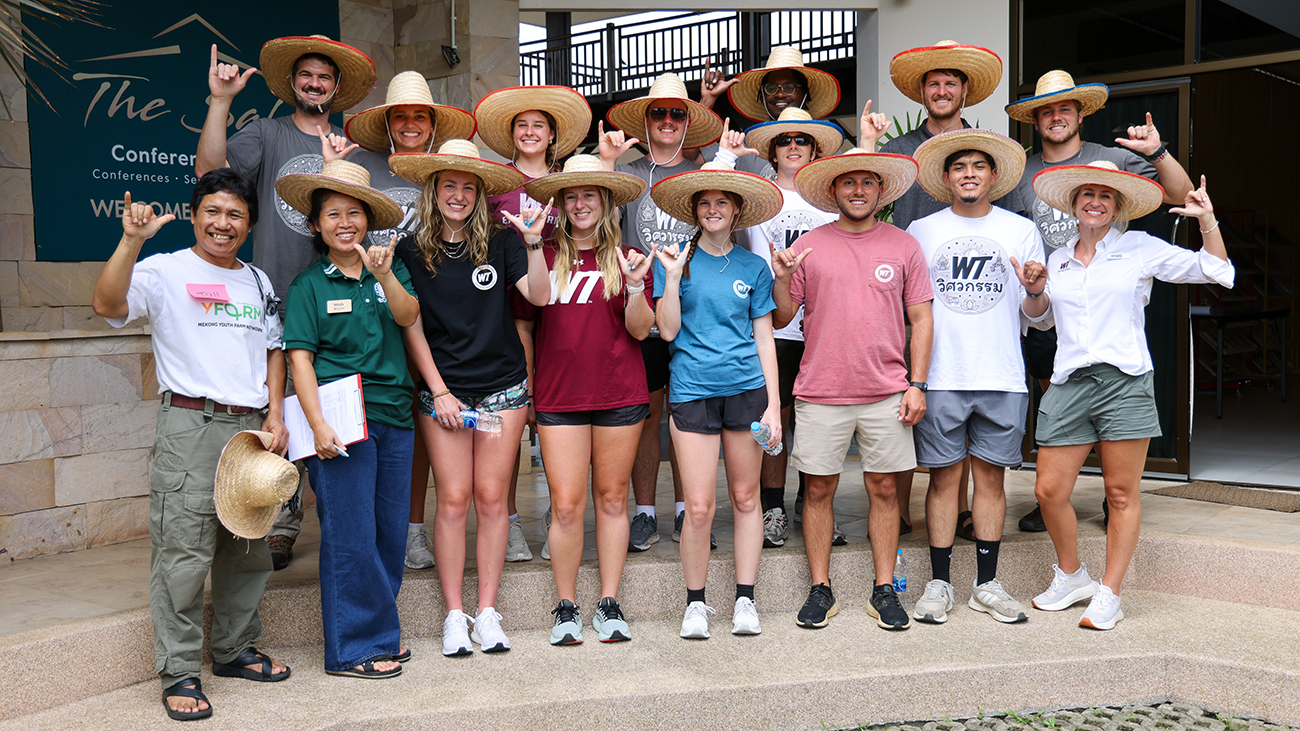- Featured
- Engineering
- Community
WT Engineering Students Provide Hands-On Aid to Thai Farmers Through Study Abroad
Copy by Chip Chandler, 806-651-2124, cchandler@wtamu.edu
CANYON, Texas — West Texas A&M University engineering students helped create efficient irrigation systems and teach rural farmers how to incorporate technology into their operations during a recent Study Abroad trip to Thailand.
Twelve students spent two weeks in Krabi and Chiang Mai, Thailand, implementing projects they had worked on throughout the spring semester and experiencing Thai culture firsthand.
“For a lot of the students, this was the first time they had seen their own designs put into practice,” said Dr. Emily Hunt, dean of WT’s College of Engineering , who led the trip. “They spend so much time in courses learning the theory behind it, so that moment when your design works is really transformative for an engineering student.”
The WT contingent—which also included Dr. Benton Allen, assistant professor of systems engineering—worked with ECHO’s Asia Impact Center , which includes a small-farm resource center and seed bank.
“Fifty percent of the world’s hungriest and 75 percent of the world’s poorest are farmers,” Allen said. “That’s who ECHO is focused on equipping with more efficient farming methods.
“The hope with all of the projects was to assist the farmers and make their operations less labor-intensive, but also to demonstrate and demystify more advanced technology for farmers who come to ECHO to learn,” Allen continued.
The team’s four projects were designing and implementing a smart irrigation system for a greenhouse; upgrading the irrigation system of a tree nursery from a flood spray to precision drip irrigation; designing a solar system to power the cooling requirements of an on-site seed bank; and creating a simple fluid dynamics chart to estimate the pump requirements of mountainous farms.
Hunt said the students gained valuable insight into how Thailand’s agricultural practices differ from American standards.

Photo: Avery Putnam, a senior civil engineering major from Austin, works on the automated watering system in the farm nursery at the ECHO Asian Impact Center.
“From an engineering perspective, we are typically trying to maximize outputs, but they are just trying to feed their communities,” Hunt said. “So ECHO isn’t focused on industrial chemicals, for example. They want farmers to have everything they need from their own environment. It’s very self-contained. A lot of our students come from farming families, and that’s now necessarily the focus here, so it was beneficial to see alternative strategies.”
WT students also worked with Myanmar refugee children in a Chiang Mai school.
Students in the group represented most of the disciplines within the engineering college—civil, electrical, environmental and mechanical engineering; and computer science; and engineering technology.
“Going to Thailand was an unforgettable experience. It was my first time traveling overseas, and I really enjoyed the culture, the people and the energy. One of the best parts for me was working with the kids and showing them hands-on engineering projects. Another big highlight was visiting the ECHO farm and helping implement an automatic watering system and proposing a solar energy project,” said SirMark Gentry, a senior electrical engineering major from Dallas. “Being part of the planning and proposal all the way to actually building it was amazing. Seeing how appreciative the people were really brought me joy, and the whole experience was honestly life changing.”
Gentry earned his associate of science degree from Dallas College and transferred to WT’s online electrical engineering program through an agreement between the two schools; he will be the first to graduate from WT through the program.
“Being in Thailand was way different than anything I ever imagined,” said Cameron Wittenborn, a junior pre-engineering major from Oro Valley, Arizona, citing the differences between the laidback beaches of Krabi and the hectic urban life of Chang Mai.
Wittenborn also was excited to see his theoretical knowledge bring projects to life in the field.
“The farmers loved to see how our brains were working in the basic design process, just our engineering mindset as it was being led by our brilliant engineering professors,” Wittenborn said. “The fact that we could make these projects work in such a short timeframe was really rewarding to see.”
Other participating students included J.T. Cavender, a master’s student in engineering from Midlothian; Taryn Gullick, a junior engineering technology major from Amarillo: Reagan Heelan, a graduate student in engineering from Kearney, Nebraska; Forrest Hosler, a sophomore pre-engineering major from Houston; Isabel Hunt, a freshman computer science major from Canyon; Ava Jones, a junior pre-engineering major from Amarillo; Ainslee Proffer, a junior mechanical engineering major from Amarillo; Avery Putnam, a senior civil engineering major from Austin; Hernan Sanchez, a sophomore pre-engineering major from Canadian; and Garrett Scardino, a master’s student in electrical engineering from Amarillo.
Among the other highlights of the trip were boat tours to surrounding islands, visiting various temples and an elephant refuge in the area, and shopping and eating at night markets.
“We know that there is nothing like providing real-world experience for our students, so we appreciate the opportunity to work collaboratively with the College of Engineering and Dr. Hunt,” said Itzel Anett, director of WT’s Study Abroad and Distinguished Scholars programs. “Faculty-led programs take a lot of effort to create, and we are so thankful to work with our faculty to provide once-in-a-lifetime experiences for our students. Ultimately, the goal is to provide all of our students with immersive global experiences that will help them stand out in the job market.”
Providing a nurturing yet rigorous educational environment for learners of all levels is a key principle of the University’s long-range plan, WT 125: From the Panhandle to the World .
That plan is fueled by the historic One West comprehensive fundraising campaign, which reached its initial $125 million goal 18 months after publicly launching in September 2021. The campaign’s new goal is to reach $175 million by 2025; currently, it has raised more than $165 million.
About West Texas A&M University
WT, a Regional Research University, is redefining excellence in Canyon, Texas, on a 342-acre residential campus, as well as the Harrington Academic Hall WTAMU Amarillo Center in downtown Amarillo. Established in 1910, the University has been part of The Texas A&M University System since 1990. WT, a Hispanic Serving Institution since 2016, boasts an enrollment of more than 9,000 and offers 66 undergraduate degree programs, including eight associate degrees; and 44 graduate degrees, including an integrated bachelor’s and master’s degree, a specialist degree and two doctoral degrees. The University is also home to the Panhandle-Plains Historical Museum, the largest history museum in the state and the home of one of the Southwest’s finest art collections. The Buffaloes are a member of the NCAA Division II Lone Star Conference and offers 16 men’s and women’s athletics programs.
Top photo: West Texas A&M University students and faculty from the College of Engineering traveled to Thailand on a Study Abroad trip, where they worked with ECHO's Asia Impact Center on more efficient farming methods. Pictured are, front from left, Pee Toh and Pee Wah of ECHO; students Isabel Hunt, Reagan Heelan, Ava Jones, Garrett Scardino and Hernan Sanchez; and Dr. Emily Hunt, dean; and, back from left, Dr. Benton Allen; students Taryn Gullick, Ainslee Proffer, Cameron Wittenborn, SirMark Gentry, Forrest Hosler; staff member Trent Kelly; and student J.T. Cavender.
—WT—

